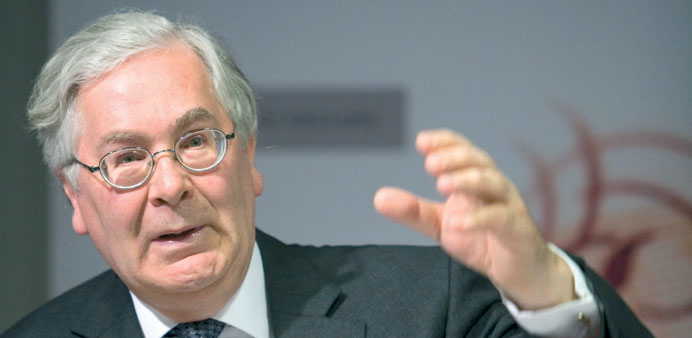Reuters/London
Bank of England Governor Mervyn King offered some rare good news for Britain’s economy yesterday when he presented his final set of economic forecasts before stepping down after more than 20 years at the bank.
For the first time in years, the central bank predicted that growth would be faster and inflation lower than it expected three months earlier, though King still warned the recovery could not be taken for granted.
“Today’s projections are for growth to be a little stronger and inflation a little weaker than we expected three months ago. That’s the first time I’ve been able to say that since before the financial crisis,” King told reporters.
“But this is no time to be complacent. We must press on to ensure a recovery and to bring down unemployment.”
Sterling rose against the dollar after the forecasts. British government bond prices extended their losses.
King has presented the BoE’s Quarterly Inflation Report every three months since the start of 1993, first as the BoE’s chief economist and since 2003 as governor.
In just over six weeks he will hand the reins to Mark Carney, who Finance Minister George Osborne is poaching from Canada’s central bank in the hope that he will bring new thinking on how to invigorate Britain’s anaemic recovery.
“We have a team of very good young players and I think with the right leadership you can look forward to a very successful future season,” said King, a fan of soccer team Aston Villa which has just escaped relegation.
However, he remained cautious about what is widely viewed as Carney’s big idea — offering long-term commitments to keep interest rates low, so long as certain economic indicators, yet to be specified, remains within particular bounds.
Osborne has asked Carney to report back on this when he presents his first inflation report in August. King said the decision was for the Bank, not the government.
“I think it is very important that those involved, and that doesn’t include me, will have time now to think through very carefully what ... to do. (This is) the decision of the Monetary Policy Committee, not that of the Treasury.”
More broadly, King said looser monetary policy would not be a panacea for Britain’s economic woes. Even the Funding for Lending Scheme, which King and Osborne launched last year and expanded last month, would be a modest help, not a game-changer.
“Monetary policy alone ... cannot solve all our problems. There are limits to what can be achieved by general monetary stimulus - in any form,” he said.
In recent months, King has advocated a resumption of the 375bn pounds ($572bn) of government bond purchases that were a mainstay of BoE policy between March 2009 and October 2012, even as the majority of policymakers opposed it.
He made no mention of more bond buying, or quantitative easing, yesterday, and it is unclear whether he voted again for it earlier this month.
“QE was notable for its absence,” said Nomura economist Philip Rush. “That tells us a lot about how the policy debate has moved in the past few months.”
The inflation report described the BoE’s monetary policy stance as “highly stimulatory” and said the economy was “likely to see a modest and sustained recovery over the next three years”. That was a small upgrade from its assessment in February that the recovery was likely to be “slow but sustained”.
Britain’s economy grew 0.3% in the first three months of 2013, dodging a new recession. The BoE forecasts 0.5% growth in the second quarter, rising to an annual rate of 2% in two years’ time.
But this would still represent Britain’s slowest economic recovery in decades, and the BoE said GDP was likely to remain below its pre-crisis level for another year or so.
The central bank also had better news on inflation, in contrast to three months ago when it shocked markets by forecasting that it would take until early 2016 before price growth fell below its 2% target.
Now inflation is seen falling to 2% in two years’ time from its current level of 2.8%.
A strengthening of sterling and lower oil prices have helped ease price pressures in recent weeks.

